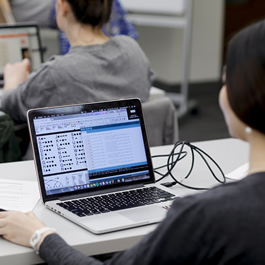Students in the Digital Media Module explore the use, design, and implications of digital communication and information technologies. Module courses cover topics such as how people learn, work, play, organize, and otherwise interact in digital environments, as well as the social, political, cultural, psychological and economic effects of digital media. Students in the module also gain relevant experience through research and internship opportunities. The module experience culminates with a capstone project designed to draw out connections between theoretical foundations learned in the classroom and practical work conducted throughout the student’s undergraduate career.
Courses
Digital Media Course Requirements
Co-Curriculars
Opportunities for application and practice on campus
There are many ways Digital Media Module students can gain valuable experience for application and practice. Some possibilities include:
- working in labs with faculty and graduate students on research projects,
- designing and implementing systems for on-campus organizations
- practical engagement seminars focused on specific applications or skills
Labs on campus
Professors at Northwestern conduct cutting-edge research in digital media and frequently look for undergraduate research assistants. More information about digital media research and relevant opportunities can be found on the following lab websites and/or by contacting affiliated professors (Note: this is not an exhaustive list).
- Social Media Lab
- Web Use Project
- SONIC
- CollabLab
- Delta Lab
- Inclusive Technology Lab
- Community Data Science Collective
- Center on Media and Human Development
Opportunities for projects, practica, and internships off campus
Digital Media Module students seeking off campus experience can seek internships in relevant industry, governmental and nonprofit organizations. Many module faculty have contacts in these organizations and can help students establish connections.
Community Building Activities
Students and faculty affiliated with the Digital Media Module are invited to talks in existing relevant speaker series (e.g., MTS, TSB, SONIC, NICO), which all feature a regular program of experts in many aspects of digital media. Top students from the module (per faculty recommendation) may be nominated to meet with speakers in group meetings or over meals.
Capstone projects are presented at an annual poster session attended by module faculty and students, along with interested graduate students from TSB (Technology and Social Behavior) and MTS (Media, Technology and Society) programs, and relevant members of the NU and larger community.
A quarterly lunch meeting allows module students to meet with the module coordinator, advising staff, and one or two module faculty members. The purpose of these meetings is to update students on new courses and other goings on, allow them to ask questions, and provide a forum for informal faculty interaction.
There are a number of other opportunities and activities that are offered on a quarterly basis for module affiliated students, including panels on applying to jobs/graduate schools, field trips, and documentary screenings. Students interested in suggesting or organizing a module-related activity may contact the module fellow.
Capstone
The Digital Media Module Capstone Experience has three components:
- Narrative reflection paper (5-7 pages, double spaced): This paper provides an opportunity for students to reflect on what they learned in the courses taken for the module, as well as any relevant experiences they had (final projects, lab work, internships, and so on). Students are expected to provide a coherent narrative of their work that identifies thematic connections between their coursework and practical experiences, and outline how their progress ties in with their goals for the future.
- Project description document/portfolio: Students will prepare a document that outlines and describes each of the significant projects/experiences they’ve done in conjunction with the module. They will also provide copies of relevant research papers, presentations or projects that they worked on. Screenshots or links can be provided for work that is interactive or that exists online.
- Spring Poster session: In the spring quarter of every year, there will be a poster session featuring the work of students who completed their capstone projects that year. This is an opportunity for students to share what they’ve accomplished with faculty and other module-affiliated students, as well as their interaction with the industry board.
Capstone projects are due on the 5th Friday of the quarter immediately following the one in which the student completed their module course requirements. They will be reviewed by module affiliated faculty. Projects will not be assigned a letter grade; rather, students will be given feedback and comments on their work. Since projects will be archived and viewed later by the alumni advisory board, students will in most cases be asked to make revisions to their project based on the feedback given, even if they have officially ‘passed’ their module requirement.
Projects are to be submitted via email to the module coordinator (Jeremy Birnholtz). Please ensure that all files are converted to pdf to ensure ease of sharing and reading on all operating systems.

